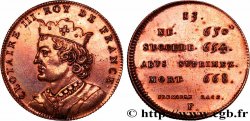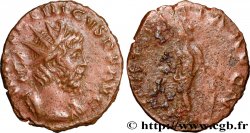E-auction 641-646366 - SÉRIE MÉTALLIQUE DES ROIS DE FRANCE Règne de HUGUES CAPET - 35 - refrappe ultra-moderne
Чтобы принять участие в торгах, вы должны войти в систему и стать подтвержденным участником аукциона. Войдите, чтобы сделать ставку. Ваш аккаунт будет подтвержден в течение 48 часов. Не ждите до закрытия торгов, чтобы зарегистрироваться.Сделав ставку на данный товар, вы вступаете в юридическое соглашение на покупку выбранного товара и нажатием кнопки «Сделать ставку» подтверждаете принятие вами условий интернет-аукционов cgb.fr.
Ставка может бить сделана только в полном эквиваленте евро. Торги закроются согласно времени, указанному в описании товара, все ставки, сделанные после закрытия торгов, учитываться не будут. Не следует откладывать предложение вашей ставки до последнего момента, так как система может не успеть обработать вашу заявку, и ваша ставка не будет принята. Более детальную информацию вы найдёте здесь: FAQ по интернет-аукционам.
БЕСПЛАТНО.
БЕСПЛАТНО.
2025/07/28 20:32:00
fme_1025453
641
Вам необходимо авторизоваться, чтобы сделать ставку
Нажмите сюда, чтобы войти
Тип Règne de HUGUES CAPET - 35 - refrappe ultra-moderne
Дата: n.d.
Металл: gilt bronze
Диаметр: 32 mm
Ориентация осей монеты: 12 h.
Вес: 21,43 g.
Век: cannelée
Пуансон: corne d’abondance
Комментарии о состоянии
Patine hétérogène avec des traces de manipulation et traces de rayures
Лицевая сторона
Аверс: легенда: HUGUES CAPET ROY DE FRANCE.
Аверс: описание: Buste imaginaire couronné et drapé à droite.
Обратная сторона
Реверс: легенда: 35. / NÉ. 941*. / COURONNÉ. 987. / RETABLISSEMENT DE LA / DISCIPLINE ECCLESIASTIQUE. / MORT 996. / COMMENCEMENT DE LA / TROISIEME RACE. / P..
Реверс: Описание: Légende en 9 lignes et corne d’abondance à l’exergue.
Комментарий
Médaille conservée sous capsule
Hugues Capet (né vers 940, mort au lieu-dit « Les Juifs », près de Prasville (Eure-et-Loir) le 24 octobre 996), duc des Francs (960-987), puis roi des Francs (987-996), fut le premier souverain de la dynastie capétienne. Fils de Hugues le Grand et de son épouse Hedwige de Saxe, il est l'héritier des puissants Robertiens, la lignée qui est en compétition pour le pouvoir avec la dynastie carolingienne et les grandes familles aristocratiques de Francie aux IXe et Xe siècles.
La fin du Xe siècle connaît le début d'une révolution économique et sociale qui allait trouver son apogée vers 1100 Les progrès agricoles, le début des défrichements et l'augmentation des capacités d'échanges entraînée par l'introduction du denier d'argent par les premiers Carolingiens, entraînent une dynamique économique encore timide mais réelle. Dans le même temps, la fin des invasions et la continuité des guerres personnelles entraînent la construction des premiers châteaux privés où peuvent trouver refuge les paysans. En parallèle, la nouvelle élite guerrière, les chevaliers, entre en concurrence avec l'ancienne aristocratie foncière carolingienne. Pour canaliser ces nouveaux venus et pour assurer la protection de leurs biens, l'aristocratie et l'Église soutiennent et exploitent le mouvement de la paix de Dieu. C'est dans ce contexte qu'Hugues Capet peut instaurer la dynastie capétienne.
Pour la suite de la biographie, voir http://fr.wikipedia.org/wiki/Hugues_Capet.
Medal preserved under capsule Hugues Capet (born around 940, died at the place called “Les Juifs”, near Prasville (Eure-et-Loir) on October 24, 996), Duke of the Franks (960-987), then King of the Franks (987-996), was the first sovereign of the Capetian dynasty. Son of Hugh the Great and his wife Hedwig of Saxony, he is the heir to the powerful Robertians, the line that competed for power with the Carolingian dynasty and the great aristocratic families of Francia in the 9th and 10th centuries..
The end of the 10th century saw the beginning of an economic and social revolution which would reach its peak around 1100. Agricultural progress, the beginning of land clearing and the increase in trading capacity brought about by the introduction of the silver denarius by the first Carolingians, led to an economic dynamic which was still timid but real.. At the same time, the end of invasions and the continuation of personal wars led to the construction of the first private castles where peasants could find refuge.. At the same time, the new warrior elite, the knights, entered into competition with the old Carolingian landed aristocracy.. To channel these newcomers and to ensure the protection of their property, the aristocracy and the Church supported and exploited the Peace of God movement.. It is in this context that Hugh Capet can establish the Capetian dynasty.
For the rest of the biography, see http://fr. Wikipedia. org/wiki/Hugues_Capet
Hugues Capet (né vers 940, mort au lieu-dit « Les Juifs », près de Prasville (Eure-et-Loir) le 24 octobre 996), duc des Francs (960-987), puis roi des Francs (987-996), fut le premier souverain de la dynastie capétienne. Fils de Hugues le Grand et de son épouse Hedwige de Saxe, il est l'héritier des puissants Robertiens, la lignée qui est en compétition pour le pouvoir avec la dynastie carolingienne et les grandes familles aristocratiques de Francie aux IXe et Xe siècles.
La fin du Xe siècle connaît le début d'une révolution économique et sociale qui allait trouver son apogée vers 1100 Les progrès agricoles, le début des défrichements et l'augmentation des capacités d'échanges entraînée par l'introduction du denier d'argent par les premiers Carolingiens, entraînent une dynamique économique encore timide mais réelle. Dans le même temps, la fin des invasions et la continuité des guerres personnelles entraînent la construction des premiers châteaux privés où peuvent trouver refuge les paysans. En parallèle, la nouvelle élite guerrière, les chevaliers, entre en concurrence avec l'ancienne aristocratie foncière carolingienne. Pour canaliser ces nouveaux venus et pour assurer la protection de leurs biens, l'aristocratie et l'Église soutiennent et exploitent le mouvement de la paix de Dieu. C'est dans ce contexte qu'Hugues Capet peut instaurer la dynastie capétienne.
Pour la suite de la biographie, voir http://fr.wikipedia.org/wiki/Hugues_Capet.
Medal preserved under capsule Hugues Capet (born around 940, died at the place called “Les Juifs”, near Prasville (Eure-et-Loir) on October 24, 996), Duke of the Franks (960-987), then King of the Franks (987-996), was the first sovereign of the Capetian dynasty. Son of Hugh the Great and his wife Hedwig of Saxony, he is the heir to the powerful Robertians, the line that competed for power with the Carolingian dynasty and the great aristocratic families of Francia in the 9th and 10th centuries..
The end of the 10th century saw the beginning of an economic and social revolution which would reach its peak around 1100. Agricultural progress, the beginning of land clearing and the increase in trading capacity brought about by the introduction of the silver denarius by the first Carolingians, led to an economic dynamic which was still timid but real.. At the same time, the end of invasions and the continuation of personal wars led to the construction of the first private castles where peasants could find refuge.. At the same time, the new warrior elite, the knights, entered into competition with the old Carolingian landed aristocracy.. To channel these newcomers and to ensure the protection of their property, the aristocracy and the Church supported and exploited the Peace of God movement.. It is in this context that Hugh Capet can establish the Capetian dynasty.
For the rest of the biography, see http://fr. Wikipedia. org/wiki/Hugues_Capet








 Cообщить об ошибке
Cообщить об ошибке Распечатать страницу
Распечатать страницу Отправить мой выбор
Отправить мой выбор Задать вопрос
Задать вопрос Consign / sell
Consign / sell
 Информация
Информация












